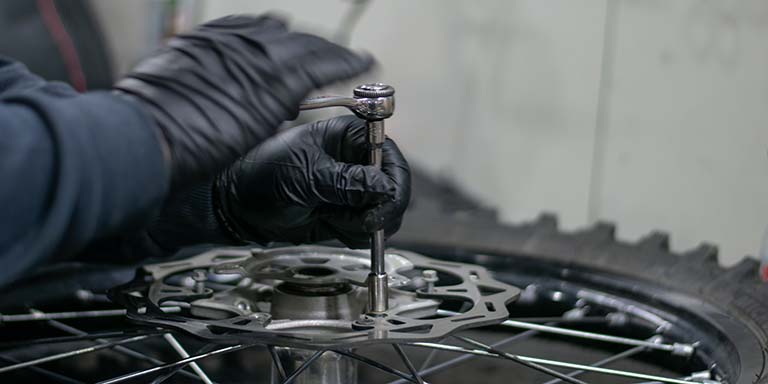A good braking system, including quality brake discs, is important for safe riding and getting the most out of your bike. But it’s equally important to pay attention to their condition and maintenance. Contrary to what you might think, brake discs need to be replaced from time to time. Although they have a fairly long service life, this can vary depending on how often they are used, as well as our riding style.
At NG BRAKES we want you to be able to enjoy your passion with maximum safety, whatever the terrain and destination. To avoid any surprises on the road and to ensure they are changed in time, it’s essential we recognise these signs:
- As you probably know, the thickness of our brake disc is the main indicator of its health. Generally, you will find the following printed on the core: MIN.TH and a certain of millimetres. This number indicates the minimum thickness needed for the disc to work properly. The most logical way to know if your disc is that thick is with a caliper. But there is another sign that can give us clues. There is a small step between the support area for the pad and the outer edge of the brake disc. Look for it. When the step is very abrupt, it’s time to measure it.
- Pay attention when braking. If you notice vibrations when the brakes have already warmed up, this may be a sign of irregular brake fluid deposition. It’s important to detect this early so it can be remedied before deformation occurs.
- Another detail that you can check regularly, to detect a possible deterioration of the disc, is the condition of the cooling holes. If you see that their shape has lost regularity, it’s time to change them.
- If you have missed all these signs, your brake disc may be bent. This is not a common occurrence, but if the disc has suffered such a high thermal peak that its internal structure has been fractured, it will no longer function properly. You will notice strong vibrations each time you apply the brakes. If you reach this point, don’t wait any longer. Replacing the disc is essential.
- In addition to all of this, another indicator of brake disc deterioration is a loss of feel in the brake levers. This loss isn’t always related to a disc malfunction. But it’s a warning that something is wrong with the braking system. If this happens, the best thing to do is to have your bike thoroughly checked to detect the problem and fix it before it becomes more serious.







